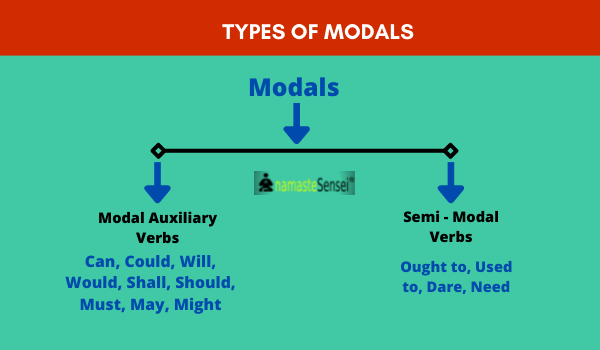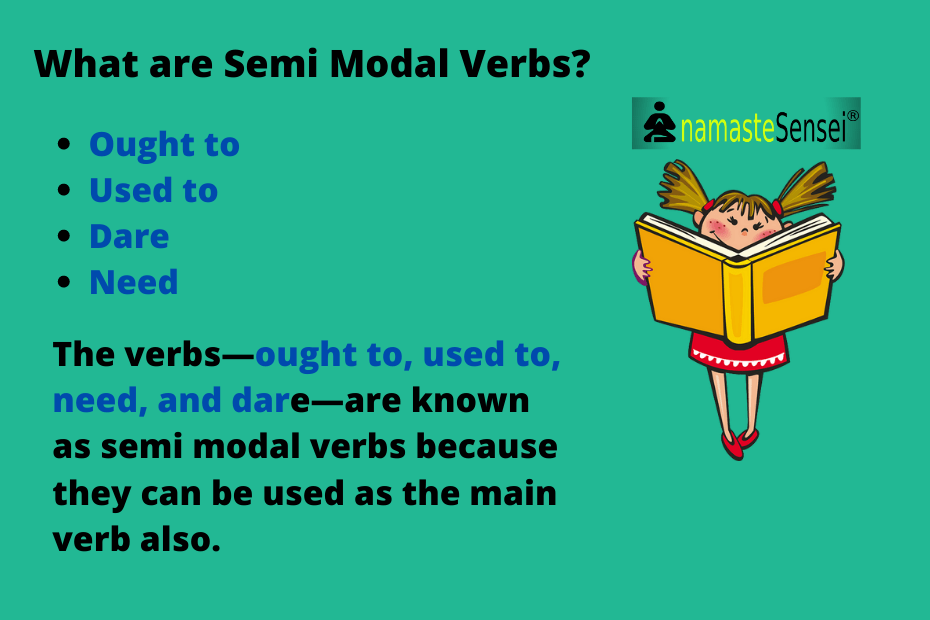Semi modal verbs | Semi modal verbs examples
अर्ध मोडल क्रिया

Semi Modal Verbs
- Ought to
- Used to
- Dare
- Need
- The verbs—ought to, used to, need, and dare—are known as semi modal verbs because they can be used as the main verb also.
क्रियाएँ – ought to, used to, need, and dare – अर्ध-मोडल क्रिया के रूप में जानी जाती हैं क्योंकि उनका उपयोग मुख्य क्रिया के रूप में भी किया जा सकता है।
इससे पहले कि आप और पढ़ें, यह एक अच्छा विचार हो सकता है की आप Modals Auxiliary Verb (can, could, will, would, etc) को किस प्रकार उपयोग किया जाता है। इसके बारे में पहले जान लें।
जरूर पढ़े – Modal Auxiliary Verbs (can, could)
Use of Semi Modal Verbs
-
Use of Semi Modal Verb – Ought to
‘To’ is always used with Ought. The usage and meaning of Ought to and should are almost the same.
Ought के साथ हमेशा ‘to’ लगता है । Ought to एवं should का प्रयोग एवं अर्थ लगभग समान है।
- The use of ought to express advice, moral obligation, and duty.
Ought to का प्रयोग advice ( सलाह) moral obligation ( नैतिक दायित्व), Duty ( कर्तव्य) को व्यक्त करता है।
Example – उदाहरण
| Advice – सलाह
Advertisements
You ought to follow the advice of the doctor. |
| Moral Duty – कर्तव्य
We ought to respect our parents. |
| Moral Obligation – नैतिक दायित्व
We ought to help our friends. |
- Not with Ought is used with reference to not fulfilling an obligation. It can also be used in the form of giving advice.
Ought के साथ not का प्रयोग किसी दायित्व को पूर्ण ना करने के संदर्भ में किया जाता है। इसका उपयोग सलाह देने के रूप में भी किया जा सकता है।
Example – उदाहरण
| You ought not to treat your friends like this. आपको अपने दोस्तों के साथ ऐसा व्यवहार नहीं करना चाहिए। |
| Children ought not to watch T.V. so long. बच्चों को इतनी देर तक टीवी नहीं देखना चाहिए। |
| You ought not to talk to the elders in this manner. आपको बड़ों से इस तरह से बात नहीं करनी चाहिए। |
| You ought not to smoke so much. आपको इतना धूम्रपान नहीं करना चाहिए। |
-
Use of Semi Modal Verb – used to
- Used to express that something used to be done habitually in the past but is not done now.
Used to का प्रयोग यह व्यक्त करता है कि भूतकाल में कोई कार्य आदतन किया जाता था लेकिन अब नहीं किया जाता है।
Example – उदाहरण
| He used to drink daily. (Now he does not drink.) वह रोज शराब पीता था। (अब वह शराब नहीं पीता।) |
| I used to smoke one packet of cigarettes. (Now I do not smoke.) मैं एक पैकेट सिगरेट पीता था। (अब मैं धूम्रपान नहीं करता।) |
| He used to go for a walk. (Now he does not go for a walk.) वह टहलने जाता था। (अब वह टहलने नहीं जाता।) |
- The negative of Used to is used in the following way.
Used to का negative मैं प्रयोग निम्न प्रकार से किया जाता है।
Example – उदाहरण
| Affirmative – सकारात्मक | Negative – नकारात्मक |
| I used to smoke daily. मैं रोजाना धूम्रपान करता था। |
I used not to smoke daily. मैं रोजाना धूम्रपान नहीं करता था। |
| He used to play chess at college. वह कॉलेज में शतरंज खेला करता था। |
He didn’t use to play chess at college. वह कॉलेज में शतरंज नहीं खेलता था। |
- The interrogative of Used to is used in the following way.
Used to का interrogative मैं प्रयोग निम्न प्रकार से किया जाता है।
Example – उदाहरण
| Affirmative – सकारात्मक | Interrogative – प्रश्नवाचक |
| He used to play chess at college. वह कॉलेज में शतरंज खेला करता था। |
Did he used to play chess at college? क्या वह कॉलेज में शतरंज खेला करता था? |
-
Use of Semi Modal Verb – dare
Dare is used both as a principal verb and modal verb, hence dare is also called a marginal modal or semi modal verb.
Dare का प्रयोग principal verb एवं modal verb दोनों प्रकार से होता है इसलिए dare को भी marginal modal or semi modal verb कहा जाता है।
- Dare is used as a modal usually in negative and interrogative sentences. Whenever dare is used as a modal, ‘to’ is not used with dare. Dare means to dare, to challenge.
Dare का modal की तरह प्रयोग सामान्यता negative एवं interrogative sentences मैं होता है। जब भी dare का प्रयोग modal की तरह होता है, तो dare के साथ ‘to’ का प्रयोग नहीं होता है। Dare का अर्थ है, दुस्साहस करना, चुनौती देना।
Example – उदाहरण
| Negative – नकारात्मक | Interrogative – प्रश्नवाचक |
| I dare not talk to the chairman. मैंने अध्यक्ष से बात करने की हिम्मत नहीं की। |
Dare I talk to the chairman? क्या मैं अध्यक्ष से बात करने की हिम्मत करता हूँ? |
| He dare not say like this. उसकी ऐसा कहने की हिम्मत नहीं हुई। |
Dare he not say like this? क्या वह ऐसा नहीं कहते हैं? |
| He dare not oppose you. उसने तुम्हारा विरोध करने की हिम्मत नहीं की। |
Dare he oppose you? क्या वह आपका विरोध करने की हिम्मत करते हैं? |
| She dare not complain against you. उसने तुम्हारे खिलाफ शिकायत करने की हिम्मत नहीं की। |
Dare she complain against you? क्या वह तुम्हारे खिलाफ शिकायत करने की हिम्मत करती है? |
- When dare is used as a modal along with Nobody, anybody, somebody, etc. Then ‘to’ may or may not be used with it.
Nobody, anybody, एवं somebody etc. के साथ जब dare का प्रयोग modal की तरह किया जाता है, तो इसके साथ ‘to’ का प्रयोग भी किया जा सकता है एवं नहीं भी किया जा सकता है ।
Example – उदाहरण
| Used – Dare | Used – Dare to |
| Nobody dare to comment like that. इस तरह की टिप्पणी करने की किसी की हिम्मत नहीं है। |
Nobody dare comment like that. इस तरह की टिप्पणी करने की किसी की हिम्मत नहीं है। |
| Somebody dare to complain in the matter. किसी ने इस मामले में शिकायत करने की हिम्मत की। |
Somebody dare complain in the matter. कोई इस मामले में शिकायत करने की हिम्मत करे। |
-
Use of Semi Modal Verb – need
- Need as a modal is commonly used in interrogative and negative sentences.
Modal के रूप में need का प्रयोग सामान्यता interrogative एवं negative वाक्य में किया जाता है।
Example – उदाहरण
| Negative – नकारात्मक | Interrogative – प्रश्नवाचक |
| He need not talk to her. उसे उससे बात करने की ज़रूरत नहीं है। |
Need he talk to her? क्या उसे उससे बात करनी है? |
| You needn’t wear a tie. तुम्हें टाई पहनने की ज़रूरत नहीं है। |
Need I wear a tie? क्या मुझे टाई पहननी चाहिए? |
- Need is used as the principal verb the following way.
Principal verb की तरह need का प्रयोग निम्न प्रकार से होता है।
Example – उदाहरण
| He needs my assistance. उसे मेरी मदद की ज़रूरत है। |
| I need your help मुझे तुम्हारी मदद की ज़रूरत है। |
| He does not need my help. उसे मेरी मदद की ज़रूरत नहीं है। |
| I did not need your advice in the matter. मुझे इस मामले में तुम्हारी सलाह की ज़रूरत नहीं थी। |
| He did not need my assistance. उसे मेरी मदद की ज़रूरत नहीं थी। |
| Does he need my help? क्या उसे मेरी मदद की ज़रूरत है? |
| Do you need my help? क्या तुम्हें मेरी मदद की ज़रूरत है? |
Semi Modal Verbs Examples
Ought to Sentence Examples
- You ought to consult a physician.
आपको एक चिकित्सक से परामर्श करना चाहिए। - We ought to help our friends.
हमें अपने दोस्तों की मदद करनी चाहिए। - Children ought not to talk to their elders in this manner. (Negative Sentence)
बच्चों को बड़ों से इस तरह से बात नहीं करनी चाहिए। (नकारात्मक वाक्य) - She ought to have invited him to the function.
उसे उसे समारोह में आमंत्रित करना चाहिए था। - I ought to talk to him today.
मुझे आज उससे बात करनी चाहिए।
Used to Sentence Examples
- He used to drink daily.
वह रोज शराब पीता था। - I used to play chess at college.
मैं कॉलेज में शतरंज खेला करता था। - I am used to cooler noise.
मुझे कूलर के शोर की आदत है। - He used to go for a walk.
वह घूमने जाया करता था।
Dare Sentence Examples
- He dare not say this.
ऐसा कहने की उसकी हिम्मत नहीं है। - How dare you speak like this.
तुम्हारी हिम्मत कैसे हुई इस तरह बोलने की। - Nobody dares to comment like that.
इस तरह की टिप्पणी करने की किसी की हिम्मत नहीं है। - He dares to oppose you.
वह आपका विरोध करने की हिम्मत करता है।
Need Sentence Examples
- He need not talk to her.
उसे उससे बात करने की जरूरत नहीं है। - He needs my assistance.
उसे मेरी मदद की जरूरत है। - I do not need your advice on this matter.
मुझे इस मामले में आपकी सलाह की जरूरत नहीं है। - Need I wear a tie?
क्या मुझे टाई पहननी चाहिए?
बधाई हो, आपने Semi Modal Verbs in Hindi का पूरा लेख पढ़ा। यदि आपके कोई संदेह या प्रश्न हैं, तो बेझिझक नीचे टिप्पणी करें। हम जितनी जल्दी हो सकेगा संपर्क करेंगे।
अधिक लेख:
Modal Auxiliary Verb |
Adjectives In Hindi (विशेषण) |
| Auxiliary Verb in Hindi | Primary Auxiliary Verb In Hindi |
Any topic you want us to cover. Let us know.
